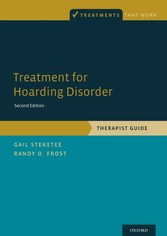Suchen und Finden
Treatment for Hoarding Disorder: Therapist Guide
The relationship people have with their possessions ranges from purely utilitarian to intensely emotional. For most people, their personal possessions provide them with a sense of security, comfort, and pleasure. However, if someone loses the ability to distinguish useful or important possessions from those that make life overly complicated, the objects can become a prison. For people who suffer from Hoarding Disorder (HD), the process of getting rid of unneeded objects is not easy. For them, possessions never feel unneeded and trying to get rid of them is an excruciating emotional ordeal. This Second Edition of Treatment for Hoarding Disorder is the culmination of more than 20 years of research on understanding hoarding and building an effective intervention to address its myriad components. Thoroughly updated and reflective of changes made to the Fifth Edition of the Diagnostic and Statistical Manual for Mental Disorders (DSM-5), this second edition of the Therapist Guide and accompanying client Workbook outlines an empirically supported and effective CBT program for treating hoarding disorder. This Therapist Guide is written for mental health clinicians-psychologists, social workers, psychiatrists, counselors, and psychiatric nurses-to guide effective treatment of people with hoarding disorder. It provides numerous assessment and intervention forms to help clients use the methods described in the intervention. A major goal of the treatment is to recapture the positive role of possessions in the lives of people with hoarding problems, and strategies are outlined for sustaining gains and making further progress, as well as for managing stressful life events that can provoke problematic acquiring and difficulty discarding.
Alle Preise verstehen sich inklusive der gesetzlichen MwSt.












